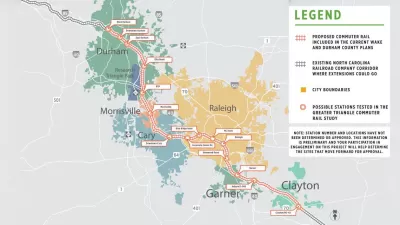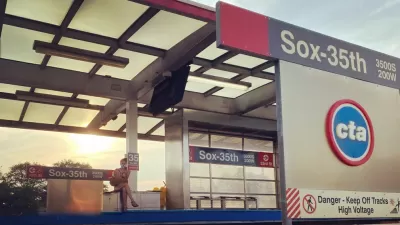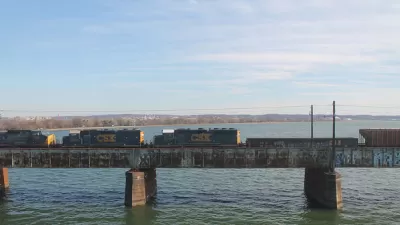As commuter patterns shift, so too do the transit funding preferences of the federal government.

A plan for a commuter rail system connecting the cities of Raleigh, Durham, and Cary in North Carolina, also known as the Triangle, won’t get the funding it needs from the federal government. According to recent reports, the rejection of the plan has everything to do with shifting commute patterns after the Covid-19 pandemic.
“Representatives of the Federal Transit Administration told a group of Triangle leaders that the COVID-19 pandemic has changed how people use transit and that trains that serve morning and evening commuters to central business districts have become outdated,” reports Richard Stradling.
The FTA also told local officials that they would support bus rapid transit (BRT) investments instead. Sig Hutchinson, who heads the board of GoTriangle, the agency leading the commuter rail planning, is paraphrased in the article saying that the FTA will pay for half of qualifying BRT lines.
Construction is already underway on the region’s first BRT route, with plans for more. “The Wake Transit Plan approved by voters in 2016 calls for building four BRT lines radiating out from downtown Raleigh,” reports Stradling. “Construction on the first line along New Bern Avenue east to a park-and-ride lot on New Hope Road is expected to begin by the end of the year, said Het Patel, the city’s transit planning supervisor.”
The Triangle started planning the commuter rail system in 2020, shortly after Duke University helped scuttle a $3.3 billion, 17-mile light rail transit plan in early 2019. The commuter rail plan would have spanned 43 miles and cost $3.2 billion, with stops at 15 stations, according to a “Commuter Rail Feasibility Report” published by Go Triangle in January 2023.
Additional news coverage of the FTA’s rejection of funding for the Triangle’s commuter rail plans is available from Axios Raleigh. “We were told the FTA is no longer funding commuter rail,” Raleigh Mayor Mary-Ann Baldwin told Axios.
FULL STORY: Feds to Triangle: Don’t expect any federal money to build your commuter rail line

Trump Administration Could Effectively End Housing Voucher Program
Federal officials are eyeing major cuts to the Section 8 program that helps millions of low-income households pay rent.

Planetizen Federal Action Tracker
A weekly monitor of how Trump’s orders and actions are impacting planners and planning in America.

Ken Jennings Launches Transit Web Series
The Jeopardy champ wants you to ride public transit.

California Invests Additional $5M in Electric School Buses
The state wants to electrify all of its school bus fleets by 2035.

Austin Launches $2M Homelessness Prevention Fund
A new grant program from the city’s Homeless Strategy Office will fund rental assistance and supportive services.

Alabama School Forestry Initiative Brings Trees to Schoolyards
Trees can improve physical and mental health for students and commnity members.
Urban Design for Planners 1: Software Tools
This six-course series explores essential urban design concepts using open source software and equips planners with the tools they need to participate fully in the urban design process.
Planning for Universal Design
Learn the tools for implementing Universal Design in planning regulations.
Ada County Highway District
Clanton & Associates, Inc.
Jessamine County Fiscal Court
Institute for Housing and Urban Development Studies (IHS)
City of Grandview
Harvard GSD Executive Education
Toledo-Lucas County Plan Commissions
Salt Lake City
NYU Wagner Graduate School of Public Service





























